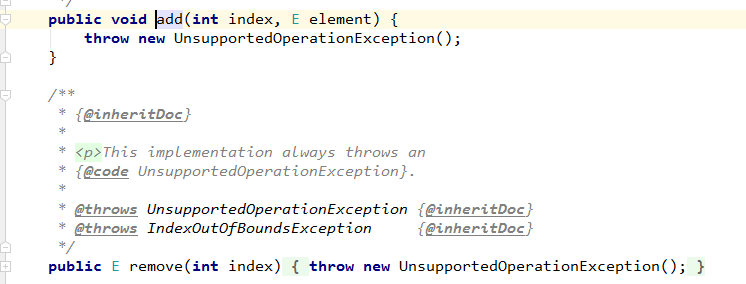Pit 1, use Array.asList to convert basic type array
Code
@Slf4j public class ArrayAsListDemo { public static void intArrayToList() { int[] arr = {1, 2, 3}; List list = Arrays.asList(arr); log.info("list:{} size:{} class:{}", list, list.size(), list.get(0).getClass()); } }
Result
list:[[I@78cb5849] size:1 class:class [I
size is 1...
Analysis
asList the first mock exam T is used as a parameter.

The above code is actually equal to

So the returned list has only one element, an int array, and three elements. As follows.
log.info(""+ list.get(0).length);//The result is 3
conclusion
You can't use Arrays.asList directly to convert arrays of basic types
Pit 2, the List returned by Arrays.asList does not support adding or deleting
Code
public static void putAndRemove() { String[] arr = {"1", "2", "3"}; List<String> list = Arrays.asList(arr); try { list.add("4"); } catch (UnsupportedOperationException ex) { log.info("add failed"); } try { list.remove("1"); } catch (UnsupportedOperationException ex) { log.info("remove failed"); } }
Result
add failed
remove failed
Analysis
ArrayList returned by Arrays.asList is the ArrayList inside Array
private static class ArrayList<E> extends AbstractList<E> implements RandomAccess, java.io.Serializable
But add and remove inside AbstractList are not implemented, ArrayList is not overridden, and add and remove are not overridden

Pit 3, changes to the original array will directly affect the list
Code
public static void modifyOriginal() { String[] arr = {"1", "2", "3"}; List<String> list = Arrays.asList(arr); log.info("list 0 before modify: "+list.get(0)); arr[0]="aaaaa"; log.info("list 0 after modify: "+list.get(0)); }
Result
list 0 before modify: 1
list 0 after modify: aaaaa
Analysis
The array list inside the array generated by asList directly uses the original array, which is probably the reason why the generated list add and remove are not allowed, because this will affect the original value.
